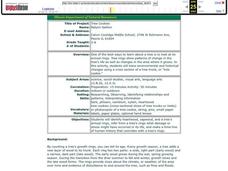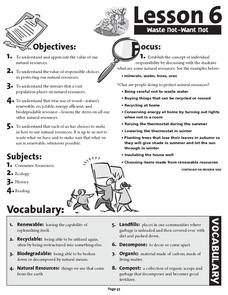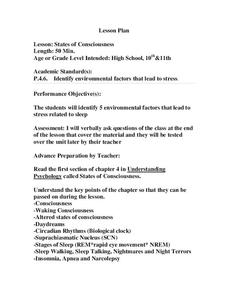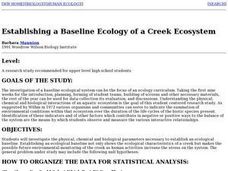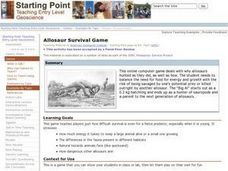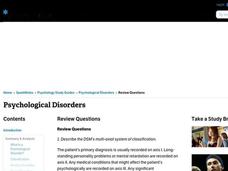Curated OER
Developing Environmental Awareness Through Problem Solving
Students examine the relationships among living and non-living parts of the environment. Using their senses, they identify the objects in their classroom. In groups, they participate in experiments to discover where electricity comes...
Curated OER
The Effect of Math Anxiety on Cardiovascular Homeostasis
Using a pulse monitor, learners will measure a resting pulse, take a math test, and then measure the pulse again. They analyze the change in pulse and compare it to performance on the test. This multi-purpose lesson plan can be used in a...
Global Oneness Project
Learning with Nature
Think outside the box - and think about education beyond the classroom walls - with a resource that has your critical thinkers watching a video about a nursery in Scotland that lets youngsters roam wild in a forest....
Curated OER
Tree Cookies
Students identify heartwood, sapwood, and a tree's annual rings, infer from a tree's rings what damage or stress might have occurred in its life, and make a time-line of human history that coincides with a tree's rings.
Curated OER
Phytoplankton
In this phytoplankton instructional activity, students read and study online information on plankton blooms to answer 8 short answer questions about the topic.
Chicago Botanic Garden
Reflecting on What I Learned About Climate Change
After three eye-opening lessons about our environment, scholars revisit a 10-question survey, reflect on their new-found knowledge, and take action by writing to a representative or creating a public service announcement about...
Chymist
Landfills and Recycling
Examine the nature of landfills through experimentation. Scholars build miniature landfills and monitor changes over a six-week period. Observations allow individuals to draw conclusions about the different types of trash and their...
Forest Foundation
Waste Not - Want Not
Recycling is the focus in the sixth of a nine-lesson series devoted to forest ecosystems. Class members read an article about the responsible use of natural resources and ways to reduce land fill.
Curated OER
Learning about a Culture from a Story
Students identify environmental influences on a traditional culture, animals and plants important to a traditional culture, and interpret the identity of a traditional culture from objects and a creation story.
Curated OER
States of Consciousness
Students investigate sleep. In this psychology lesson, students discuss five environmental factors leading to stress related to sleep.
Curated OER
Establishing a Baseline Ecology of a Creek Ecosystem
Students investigate the physical, chemical and biological parameters necessary to establish an ecological baseline. Establishing an ecological baseline not only shows the ecological characteristics of a creek but makes the possible...
Curated OER
Renewable Energy in Connecticut - Softening Our Footprint through Sustainable Energy Use
Students explore energy conservation. In this environmental lesson plan, students will look at data showing the amounts of energy used, our carbon footprint, and will research a power source. This unit allows for a deeper understanding...
Curated OER
Allosaur Survival Game
Students uses this game to see how difficult survival is even for a fierce predator, especially when it is young. It stresses: How much energy it takes to keep a large animal alive or a small one growing, The differences in the fauna...
Curated OER
Old Solutions - New Solutions
Students examine descriptions of a mining company's land-reclamation project. They share information to analyze the environmental impact of the project. Independently, they answer questions on environmental and economic issues...
Curated OER
Wilderness Survival: A Field Practicum
Learners use hands-on field-testing of authentic application from principles pertaining to: Psychology- A. Develop a positive, can-do attitude with a high degree of self-reliance that is transferable to human interactions outside of the...
Curated OER
Global Resources: What Will You Do with Your Power?
Students examine the human impact on natural resources. They read and discuss an article, evaluate nations regarding their environmental problem-solving, develop a presidential speech on the environment, and conduct a natural resources...
Curated OER
Sociobiology: Heredity Factors
Students examine DNA replication and how proteins are synthesized from DNA codes and continue to explore the effects of genetics in additional lessons. Among the topics covered are: protein synthesis, cell chemistry, environmental...
Curated OER
Recycling
Third graders observe the importance of recycling. In this environmental lesson, 3rd graders will view experiments on water filtration, paper-making, and breathing pollutants, and will categorize recyclable materials.
Curated OER
Lessons From the Lorax
Students read and discuss Dr. Seuss's The Lorax. They explore the changes the characters could have made to preserve the environment and relate the plot to real-world places and events.
Cornell University
Bacteria Take Over and Down
Bacteria outnumber all other forms of life on Earth. Scholars observe the growth of bacteria in petri dishes to understand their role in maintaining good health. Then, they observe the growth of bacteria after they introduce...
Serendip
Cell Differentiation and Epigenetics
Pregnant women exposed to PAH air pollution increase the risk of obesity in their children. The example of epigenetics, along with others, builds the basis for understanding the process of cell differentiation. Scholars view a video,...
Curated OER
Coral Bleaching
Students examine the relationship between corals and zooxanthellae, identify stresses to corals, and explain coral bleaching. In this sea life lesson students predict the effects of increased temperatures on coral reefs.
Curated OER
Guidebook
Learners create a book about plants they observe after identifying and researching them.
Curated OER
Psychological Disorders
For this psychology worksheet, students complete 5 short answer questions on pscyhological disorders. They identify characteristics of have certain disorders.





